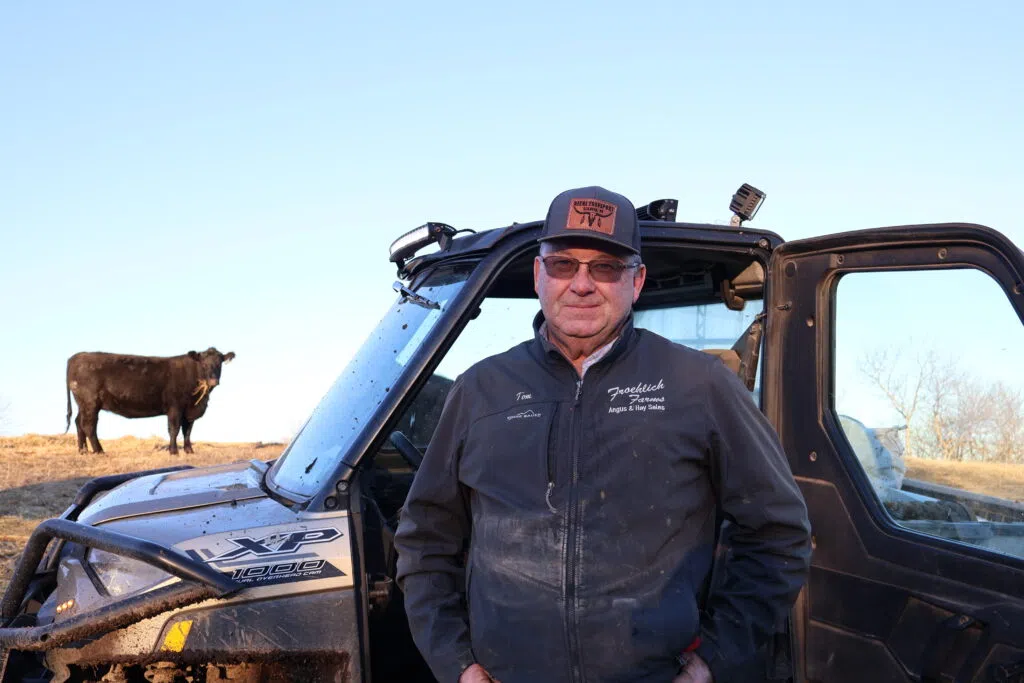
Tom Murphy ranches near Killdeer. He expects to lose money he invested with Agridime, a Texas-based cattle company. (Jeff Beach/North Dakota Monitor)
KILLDEER, N.D. (North Dakota Monitor) – Tom Murphy said the money he expects to lose from his investments in the Agridime cattle company is substantial but “it’s not gonna break me.”
Still, he worries about neighbors, especially younger ranchers who put money into what federal investigators have now labeled a Ponzi scheme — taking money from investors to pay off earlier investors, until the scheme collapses.
“The young guys are the ones that are going to be in trouble,” he said.
Murphy said he knows of others in North Dakota’s Dunn County who borrowed against their property to invest in Agridime — literally betting the farm.
Most, but not all, are ranchers like Murphy, who has about 250 head of cattle north of Killdeer.
Texas-based Agridime owes North Dakota investors about $40 million, according to one state official. Killdeer-based sales representative Taylor Bang is accused by the North Dakota Securities Department of making $6 million in commissions from illegal contracts.
Federal investigators shut down Agridime in December and are trying to figure out what the company has for assets, including about 8,000 head of cattle in 18 states, and processed meat, according to an update posted on Agridime.com, which was taken over by the Securities and Exchange Commission.
“With regard to the cattle and meat, we have found Agridime’s records to be, at a minimum, outdated and inaccurate,” the update said.
North Dakota Agriculture Commissioner Doug Goehring said there have been 149 investors identified in North Dakota. Carl Karpinski of the North Dakota Securities Commission said they are owed about $40 million, more than any other state where Agridime operated until federal authorities took over.
North Dakota “is kind of the epicenter,” Karpinski said.
The full impact of the North Dakota losses is unclear. On top of the $40 million from people who invested in cattle on paper, with the promise of large returns, there are ranchers who sold cattle to Agridime but have yet to get paid.
In December, the Securities and Exchange Commission said there was $191 million owed to 2,100 investors in 15 states.
The North Dakota agencies are still working with the Securities and Exchange Commission on the investigation that also involves the FBI.
Company made bold claims
One Agridime advertisement promised a 15% to 20% return on investment and said, “Have you ever wanted to make money raising cattle without having to do all the work?”
A complaint from the Securities and Exchange Commission said Agridime sometimes promised as much as a 32% return on investment.
An Agridime video describes how for $2,000 per beef calf, the money would be used to pay for feed and expenses until it could be processed. Agridime would ultimately sell the beef.
But a Securities and Exchange Commission complaint against the company said Agridime diverted at least $58 million in investor funds to make Ponzi payments to prior investors.
Agridime was incorporated in 2017. The Agridime website lists Josh Link, Tia Link and Jed Wood as owners. Bang later joined as a sales agent, which is how Murphy got involved. Bang is not named in the SEC complaint.
Murphy said his first investments in Agridime went well — money was wired into his bank account at the promised time. The success of Agridime lured in other investors.
His next investment was not due to pay a return until May, but he doesn’t see that happening.
North Dakota’s Securities Department issued cease-and-desist orders against Agridime and sales rep Bang in December.
The order against Bang accuses him of earning $6 million in illegal sales commissions and selling unregistered securities without a license.
That number is “way high,” Bang told the North Dakota Monitor in December.
He said at the time he became involved with Agridime when company representatives were in his sales territory. “I said, ‘Hey, let’s try to work together instead of against each other and make it better for everybody.’”
Murphy and other ranchers had worked with Bang as a cattle broker for years before Bang became involved with Agridime.
He had a “fantastic reputation,” Murphy said of Bang, who grew up in Killdeer. Even years when the cattle prices fell and he may have lost money, Bang honored those contracts, Murphy said.
He said he doesn’t think Bang intended to swindle anyone, but eventually Agridime could not make good on its promises.
Bang did not return messages left on his cellphone on Jan. 31.
Flagged by a banker
The tip that led to the investigation came from a North Dakota banker who was working with a client that had invested in Agridime, Goehring said. The banker was questioning if Agridime was legitimate.
Because Agridime was selling shares in cattle investments, Goehring said it wasn’t an Agriculture Department issue but a Securities Department one.
Karpinski said North Dakota was the second state to issue a cease-and-desist order against Agridime after Arizona, where part-owner Josh Link lives. He said those state orders helped launch the federal investigation.
Karpinski said that after such an order is given, the parties subject to the order can request a hearing and make their case to continue to do business in the state. Agridime requested a hearing and kept taking investments — another $9 million before federal authorities shut it down.
But North Dakota investors still placed orders with Agridime, including Murphy.
“That’s how dumb I was,” Murphy said.
Murphy said he asked Bang about the May cease-and-desist order. He said Bang told him “business as usual,” for Agridime.
He said the contract he signed was pretty simple — too simple, with no indication of where the calves were being fed or would be processed, or brand or ear tag information to identify a specific animal. He said it was Josh Link, not Bang, that signed the contract.
“If you took it in to a lawyer, they’d laugh you out of the office,” he said.
Bang and his attorney, Brent Edison of Vogel Law Firm in Fargo, have requested a hearing on the cease-and-desist order.
Edison said one purpose of the hearing would be to determine whether the cattle investment contracts fit the definition of a security.
When asked if Bang also was owed money by Agridime, Edison told the North Dakota Monitor that Bang was “similarly situated” to other Agridime investors.
Karpinski said “It is certainly a possibility that he was at least partially a victim,” but noted that Bang did receive millions in commissions.
The cease-and-desist order requested that Bang give money from those commissions to the state to establish a fund that would help pay back investors part of what they are owed.
Karpinski said that hasn’t happened yet.
He said federal authorities may want the money for its own fund.
“We’re not going to be able to double recover,” he said.
He added that the amount paid back could be subject to negotiation but “he’s going to need to pay that money back at some point,” Karpinski said.
Karpinski said the hearing is on hold while the federal investigation continues.
On the investigation, Edison said, “We would cooperate to the extent that we could do so.”
Sold cattle, but didn’t get paid
Larry Sorenson of Watford City said he didn’t become aware of the cease-and-desist order against Agridime until after he had agreed to sell cattle to the company.
He said Agridime still owes him money for cattle that were processed last year.
He had sold cattle to Agridime the two previous years, he said, and had gotten paid on time.
“I felt comfortable that they were a reputable company,” he said.
He contracted a price with Agridime. The cows were sent to a feedlot in Kansas. Sorenson retained ownership of the cattle while Agridime picked up the feed bills. He said the cattle should have grown to market weight by September or October, and he would get paid in November.
As far as he knows, the last of the cows was slaughtered on Nov. 26, but he hasn’t gotten paid and is not sure he will be.
“It’s going to be late in the year before we see anything, if we do see anything,” Sorenson said.
Without that revenue, he may have to take out an operating loan for the coming year.
Sorenson has filed a claim through the Packers and Stockyards Act, which would require that Agridime establish a bond fund that could be tapped to cover claims from beef producers who didn’t get paid.
There also is a bond fund in North Dakota, but only for $140,000, Goehring said. He said he was working with Agridime last spring to increase the bond, but the company never complied. The North Dakota Department of Agriculture did not renew Agridime’s license when it expired in June.
Goehring said the lesson for producers is to “understand who you’re dealing with.”




Comments